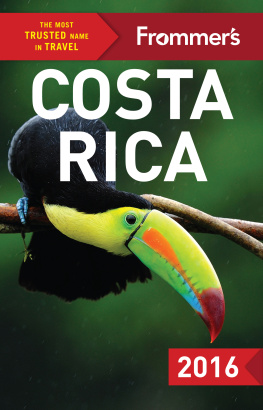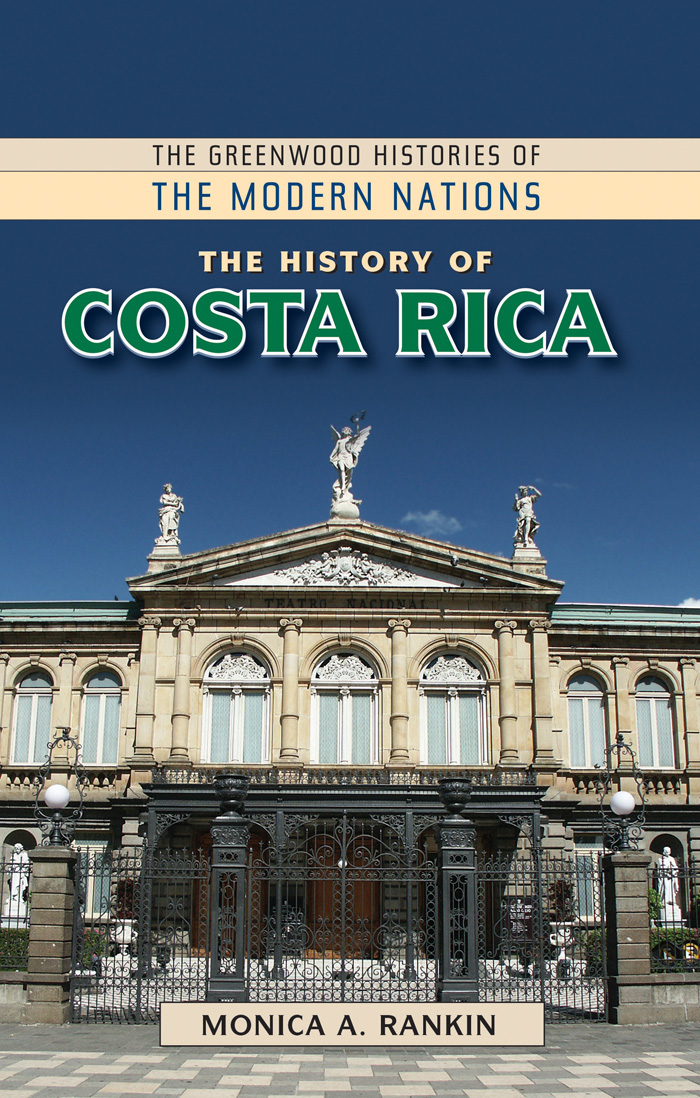MONICA A. RANKIN
MONICA A. RANKIN, PhD, a pioneer in the study of Mexican diplomacy, gender, fashion, and identity in the 1940s, is assistant professor of history at the University of TexasDallas. Rankin specializes in the history of Mexico, Latin America, and U.S.Latin American relations. Her published works include Mxico, la patria! Propaganda and Production during World War II and Encyclopedia of Latin American History and Culture: The Search for National Identity, 1820s1900. She has also written several chapters and articles on various aspects of Mexican foreign policy, gender, and popular culture during World War II. Dr. Rankins current research examines popular culture, gender, and nationalism in twentieth-century Mexico as well as issues of U.S.Latin American relations in the 1940s.
The History of Costa Rica
Monica A. Rankin
ABC-CLIO
Copyright 2012 by Monica A. Rankin
All rights reserved. No part of this publication may be reproduced, stored in a retrieval system, or transmitted, in any form or by any means, electronic, mechanical, photocopying, recording, or otherwise, except for the inclusion of brief quotations in a review, without prior permission in writing from the publisher.
Library of Congress Cataloging-in-Publication Data
Rankin, Monica A., 1972
The history of Costa Rica / Monica A. Rankin.
pages cm. (The Greenwood histories of the modern nations)
Includes bibliographical references and index.
ISBN 9780313379444 (hardcopy : alk. paper) ISBN 9780313379451 (ebook)
1. Costa RicaHistory. I. Title.
F1546.R36 2012
972.86dc23 2011053292
ISBN: 9780313379444
EISBN: 9780313379451
1615141312 12345
This book is also available on the World Wide Web as an eBook.
Visit www.abc-clio.com for details.
Greenwood
An Imprint of ABC-CLIO, LLC
ABC-CLIO, LLC
130 Cremona Drive, P.O. Box 1911
Santa Barbara, California 93116-1911
This book is printed on acid-free paper
Manufactured in the United States of America
Advisory Board
John T. Alexander
Professor of History and Russian and European Studies,
University of Kansas
Robert A. Divine
George W. Littlefield Professor in American History Emeritus,
University of Texas at Austin
John V. Lombardi
Professor of History,
University of Florida
To Brian
Pura Vida, mi amor
Contents
Series Foreword
The Greenwood Histories of the Modern Nations series is intended to provide students and interested laypeople with up-to-date, concise, and analytical histories of many of the nations of the contemporary world. Not since the 1960s has there been a systematic attempt to publish a series of national histories, and as series editors, we believe that this series will prove to be a valuable contribution to our understanding of other countries in our increasingly interdependent world.
Some 40 years ago, at the end of the 1960s, the Cold War was an accepted reality of global politics. The process of decolonization was still in progress, the idea of a unified Europe with a single currency was unheard of, the United States was mired in a war in Vietnam, and the economic boom in Asia was still years in the future. Richard Nixon was president of the United States, Mao Tse-tung (not yet Mao Zedong) ruled China, Leonid Brezhnev guided the Soviet Union, and Harold Wilson was prime minister of the United Kingdom. Authoritarian dictators still controlled most of Latin America, the Middle East was reeling in the wake of the Six-Day War, and Shah Mohammad Reza Pahlavi was at the height of his power in Iran.
Since then, the Cold War has ended, the Soviet Union has vanished, leaving 15 independent republics in its wake, the advent of the computer age has radically transformed global communications, the rising demand for oil makes the Middle East still a dangerous flashpoint, and the rise of new economic powers like the Peoples Republic of China and India threatens to bring about a new world order. All of these developments have had a dramatic impact on the recent history of every nation of the world.
For this series, which was launched in 1998, we first selected nations whose political, economic, and socio-cultural affairs marked them as among the most important of our time. For each nation, we found an author who was recognized as a specialist in the history of that nation. These authors worked cooperatively with us and with Greenwood Press to produce volumes that reflected current research on their nations and that are interesting and informative to their readers. In the first decade of the series, more than 40 volumes were published, and as of 2008, some are moving into second editions.
The success of the series has encouraged us to broaden our scope to include additional nations, whose histories have had significant effects on their regions, if not on the entire world. In addition, geopolitical changes have elevated other nations into positions of greater importance in world affairs and, so, we have chosen to include them in this series as well. The importance of a series such as this cannot be underestimated. As a superpower whose influence is felt all over the world, the United States can claim a special relationship with almost every other nation. Yet many Americans know very little about the histories of nations with which the United States relates. How did they get to be the way they are? What kind of political systems have evolved there? What kind of influence do they have on their own regions? What are the dominant political, religious, and cultural forces that move their leaders? These and many other questions are answered in the volumes of this series.
The authors who contribute to this series write comprehensive histories of their nations, dating back, in some instances, to prehistoric times. Each of them, however, has devoted a significant portion of their book to events of the past 40 years because the modern era has contributed the most to contemporary issues that have an impact on U.S. policy. Authors make every effort to be as up-to-date as possible so that readers can benefit from discussion and analysis of recent events.
In addition to the historical narrative, each volume contains an introductory chapter giving an overview of that countrys geography, political institutions, economic structure, and cultural attributes. This is meant to give readers a snapshot of the nation as it exists in the contemporary world. Each history also includes supplementary information following the narrative, which may include a timeline that represents a succinct chronology of the nations historical evolution, biographical sketches of the nations most important historical figures, and a glossary of important terms or concepts that are usually expressed in a foreign language. Finally, each author prepares a comprehensive bibliography for readers who wish to pursue the subject further.
Readers of these volumes will find them fascinating and well written. More importantly, they will come away with a better understanding of the contemporary world and the nations that comprise it. As series editors, we hope that this series will contribute to a heightened sense of global understanding as we move through the early years of the twenty-first century.
Frank W. Thackeray and John E. Findling
Indiana University Southeast
Preface
I first ventured to Costa Rica in 1991 as a nave college student from the Midwest, embarking on the grand adventure that was my summer study abroad in Central America. I had hoped the trip would fine-tune my Spanish language skills, having been told by numerous language experts that in order to









